Festive Football in Great Britain
Festive football was a tradition of the British game, introduced even before the very first seasons of the league. While Boxing Day (St Stephen’s Day) fixtures continue to the current era, Christmas Day matches fizzled out in England during the late 1950s and lingered a few years longer in Scotland. Britain’s last Christmas Day football took place in two games played north of the border in 1976.
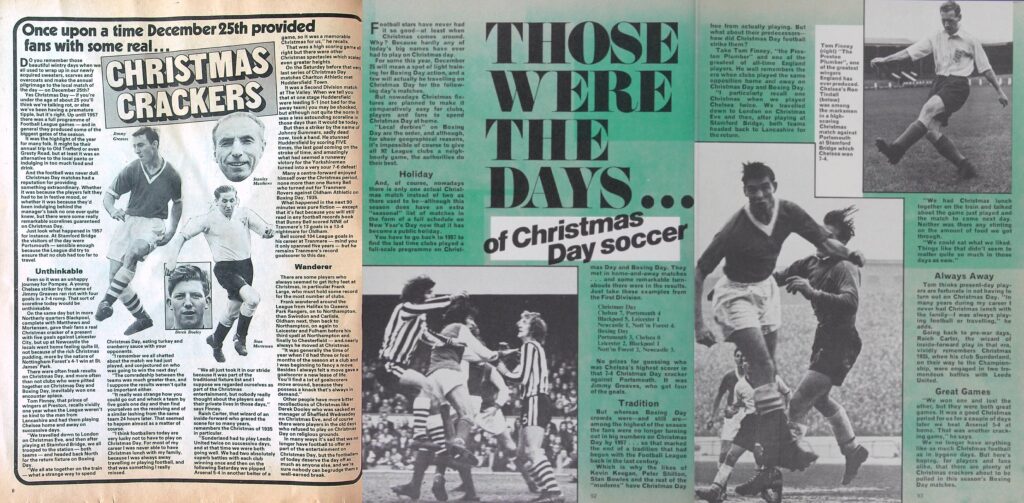
This long tradition began with a historic game between the world’s two oldest clubs at Sandygate Road, Sheffield, on Boxing Day 1860. In what was both the first inter-club match and English football’s first derby, Sheffield FC played Hallam and Stumperlowe under the ‘Sheffield Rules’. Once established, festive football remained popular, with Everton playing twice at their Anfield home on Christmas Day 1888. A morning Lancashire Cup tie was followed by an exhibition game in the afternoon, before they played local rivals Bootle on Boxing Day.
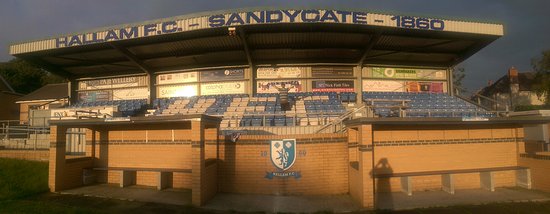
The League adopted Boxing Day matches in its very first season, as Derby welcomed Bolton to the County Cricket Ground and West Brom hosted Preston at Stoney Lane in 1888. The following year, the first league fixture took place on Christmas Day, Preston’s meeting with Aston Villa at Deepdale. The top of the table clash attracted over 9,000 fans, and ended in a 3-2 win for the home team on their way to a second successive league title. Four more Boxing Day games followed the next day, with Preston and Villa both straight back into action.
Football on both Christmas and Boxing Day soon became part of the league calendar. While fatigue was seemingly not a concern, travel was potentially a bigger problem, and back-to-back fixtures between local rivals were adopted. In 1908, several derby fixtures were played on successive days, for example the meetings of Sheffield United and the Wednesday. However in the same year the calendar also threw up long journeys such as Bradford-Bristol City, Leicester Fosse-Woolwich Arsenal in the First Division, and Oldham-Tottenham in the Second.

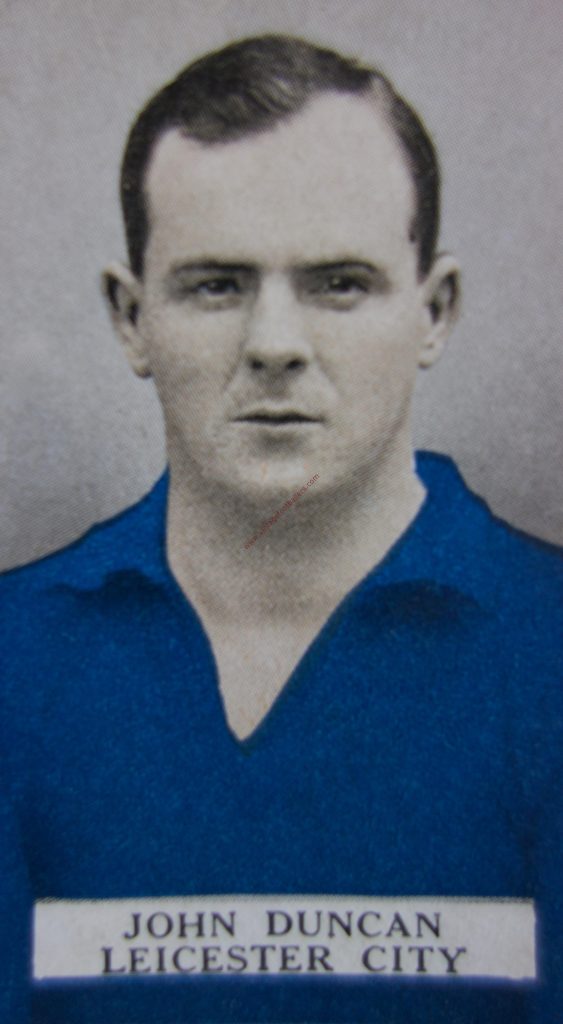
The Christmas-Boxing Day ‘double-header’ threw up some freak scorelines and unusual feats, with teams given an immediate chance to avenge defeats. One of the most notable was Tranmere’s turn-around against Oldham in 1935; after a 4-1 defeat at Boundary Park, Tranmere won the home fixture 13-4 on Boxing Day, with Bob ‘Bunny’ Bell scoring nine goals and even missing a penalty. Leicester City’s John Duncan had set a club record with six goals in a 7-0 home win over Port Vale on Christmas Day 1924. Bury beat Manchester City 6-5 on Christmas Day the following year, and completed a double the very next day.
One of English football’s greatest goalscorers, Jimmy Greaves got the first of his 34 career hat-tricks on Christmas Day 1957 when he scored four in a 7-4 win for Chelsea against Portsmouth at Stamford Bridge. However Greaves reflected the opinion of many in the game when he wrote in the Daily Express in 1958 that “most of us would like to see an end to Christmas Day football”. Boxing Day 1963 saw record high-scoring, with 66 goals across ten First Division fixtures, including six hat-tricks. Fulham beat Ipswich 10-1 while Blackburn won 8-2 at West Ham; both results were reversed in the return games played 48 hours later.
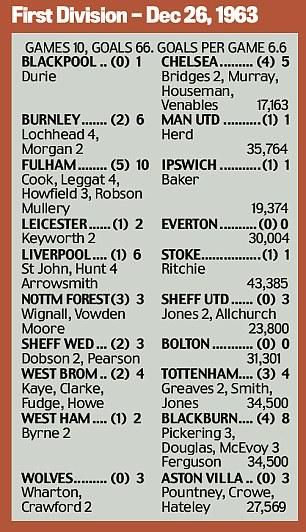
Above: First Division results, Boxing Day 1963; Below: Festive football programmes from TheSkyStrikers collection
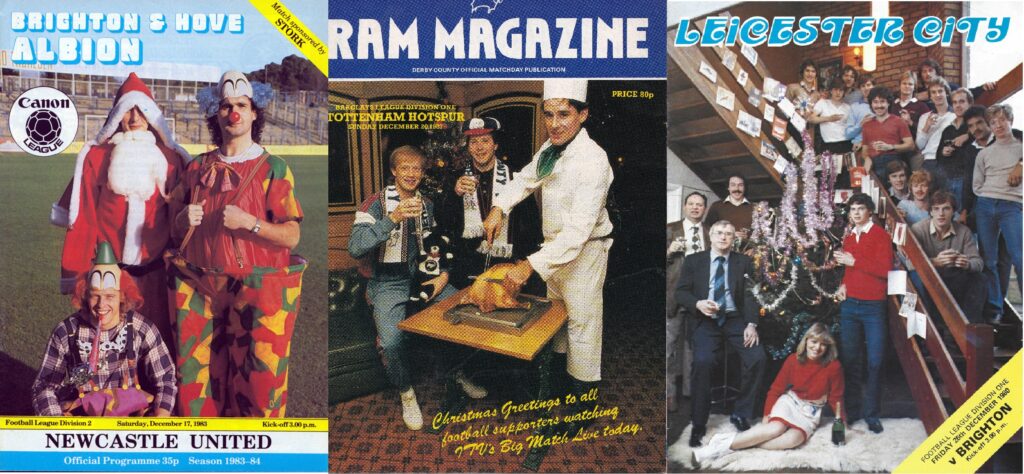
During the Second World War, future England striker Len Shackleton appeared for Bradford Park Avenue in a 1940 Christmas Day morning fixture before turning out for neighbours Bradford City in the afternoon. On the same day, another international, Tommy Lawton, achieved the same feat by representing both Everton and Tranmere Rovers. As England manager, Bobby Robson later reminisced about the days of festive football and the double-headers: “I must say as a player I enjoyed the all-action Christmas, although it is better now that it has been reorganised.”
Meanwhile Christmas Day fixtures became gradually less popular, given the logistics of travel and increased entertainment options in the post-War era. The tradition began to enter its final years with 38 matches played in 1957, falling to nine in 1958. Only two re-arranged Christmas Day fixtures took place in 1959: a First Division match between Blackburn and Blackpool, and Coventry v Wrexham in the Third Division – a game which saw the home side’s Ken Satchwell score four in the last Christmas Day hat-trick. England’s final fixture on 25 December again saw Blackpool meet Blackburn, this time at Bloomfield Road in 1965. Among the scorers in a 4-2 home win in front of 20,851 was future World Cup winner, Alan Ball. There was one final attempt to revive the tradition in 1983, when Brentford proposed playing their home game with Wimbledon on Christmas Day, but moved it to Christmas Eve after protests from supporters.
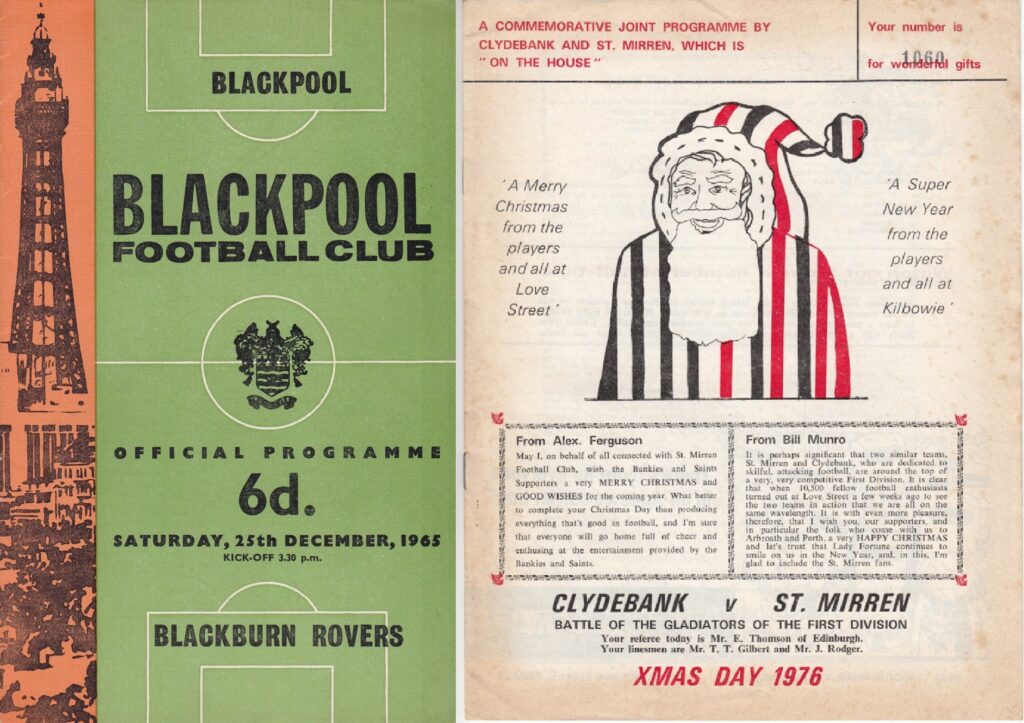
Scotland had a different festive tradition, with Christmas Day not becoming a public holiday until 1958, followed by Boxing Day in 1974. New Year’s Day fixtures were, and remain, a highlight of the Scottish football calendar. However games would be played on Christmas and Boxing Day if they fell on a Saturday. The first official Boxing Day fixture was Renton v Eastern, a Scottish Cup quarter-final in 1874 – further cup ties took place on Christmas Day, 1880. The second season of the league saw a Boxing Day programme in 1891, with Christmas Day matches following in 1897.
These festive fixtures continued into the post-War era, with the last full Christmas Day programmes played in 1965 and 1971. Further games falling on the 25th were re-scheduled as a rule, with Britain’s final Christmas Day football seen in 1976: Clydebank v St Mirren, and Alloa Athletic v Cowdenbeath. Clydebank and St Mirren jointly produced the programme for their First Division clash at Kilbowie Park, containing seasonal messages from managers Bill Munro and Alex Ferguson. The game finished 2-2.
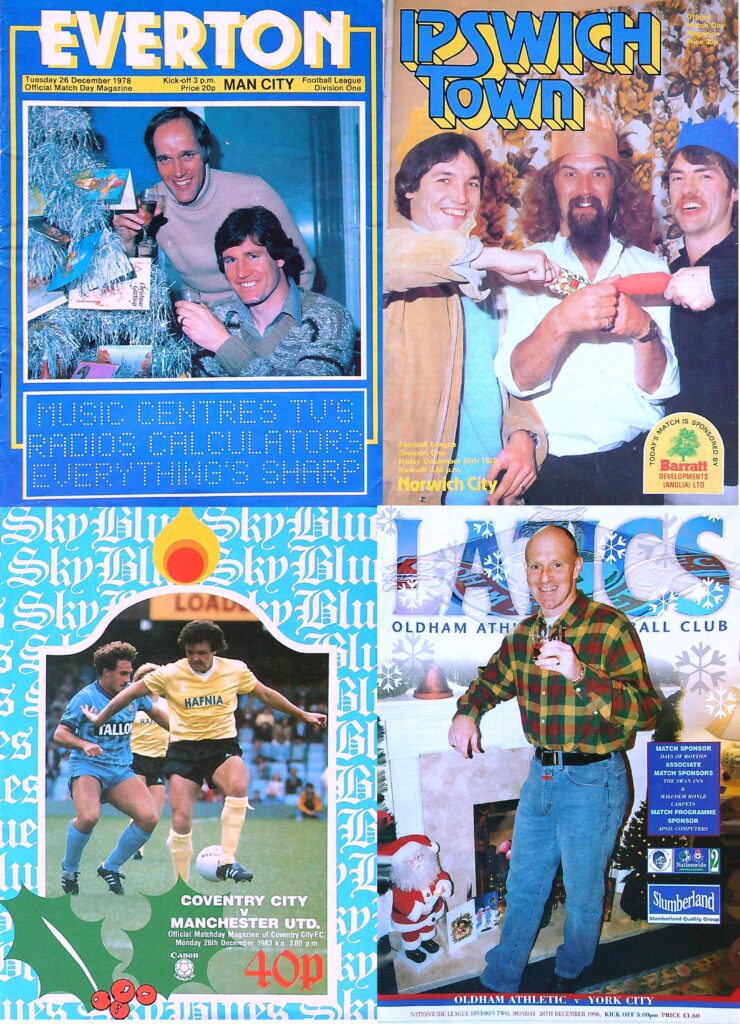
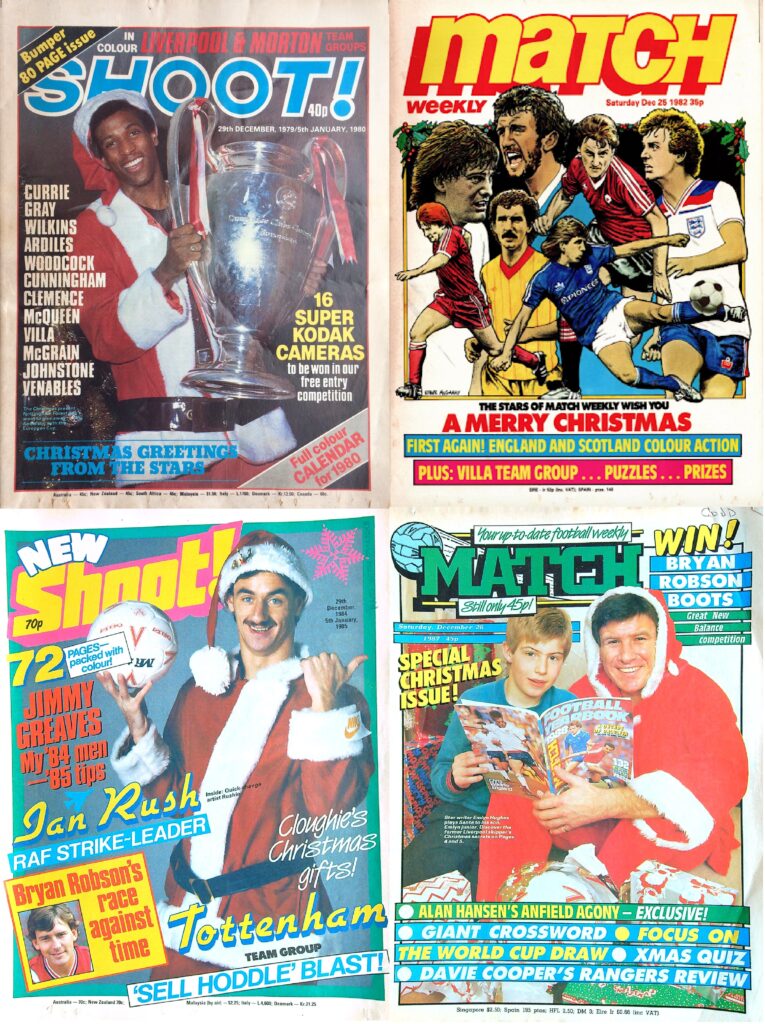
With thanks to Andy Mitchell at Scottish Sport History for providing background on festive fixtures in Scottish football, and the image from the 1976 Clydebank-St Mirren match programme.
Programme images courtesy of Miles McClagan (Flickr & twitter @TheSkyStrikers).
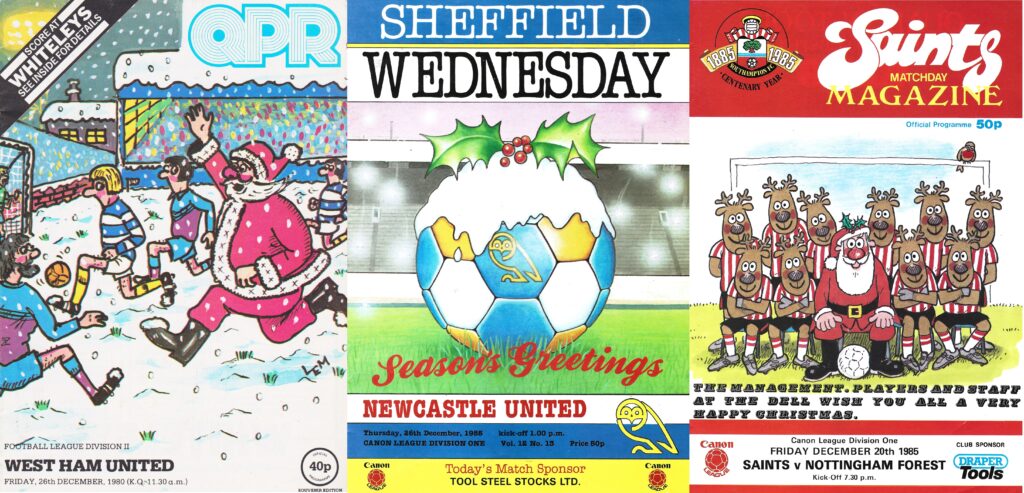
Festive football programmes from TheSkyStrikers collection
Fascinating article. I often wondered why Xmas Day fixtures took place.
Thank you for reading and commenting John. I enjoyed researching it – an interesting slice of football history but sadly I don’t think we’ll see the festive double-header again…